

-
-
- 메일 공유
-
https://dev.stories.amorepacific.com/en/a-more-beautiful-challenge-made-simple
A MORE Beautiful Challenge Made Simple

Part 1. Megatrends of Innovation, Open Innovation (feat. Plastic)
Columnist
Na Woo-ri CSR Tream

Not long ago, I had the opportunity to attend a social value-linking event involving significant corporations and social ventures. One memorable moment was a lecture where a representative of a large corporation appealed to the predominantly social venture audience, urging more utilization of large corporations. It was a poignant reminder that, for these corporations to restructure existing value chains and advance toward ESG management, new connections and collaborations are essential. Therefore, in this column, I intend to discuss open innovation, a trend for sustainable business, and plastic issues.
Corporate Dilemmas
in Facing Uncertainty
and Ambiguity
Notably, the environmental (E) aspect of ESG has instilled a sense of crisis in countries worldwide. We are moving in a direction where companies are directly shouldering the environmental costs passed onto society. Environmental issues are no longer just an ethical responsibility but are starting to be intertwined with real business risks. Consequently, corporate dilemmas are deepening as there are limits to what can be resolved through a company's legacy.

To cope with the uncertainties and ambiguities of ESG, companies are seeking to identify opportunities in the market and explore areas that may currently be non-market. In this situation, ESG can remain uncertain for the company or become a blue ocean. So, how can companies integrate ESG into the business value chain?
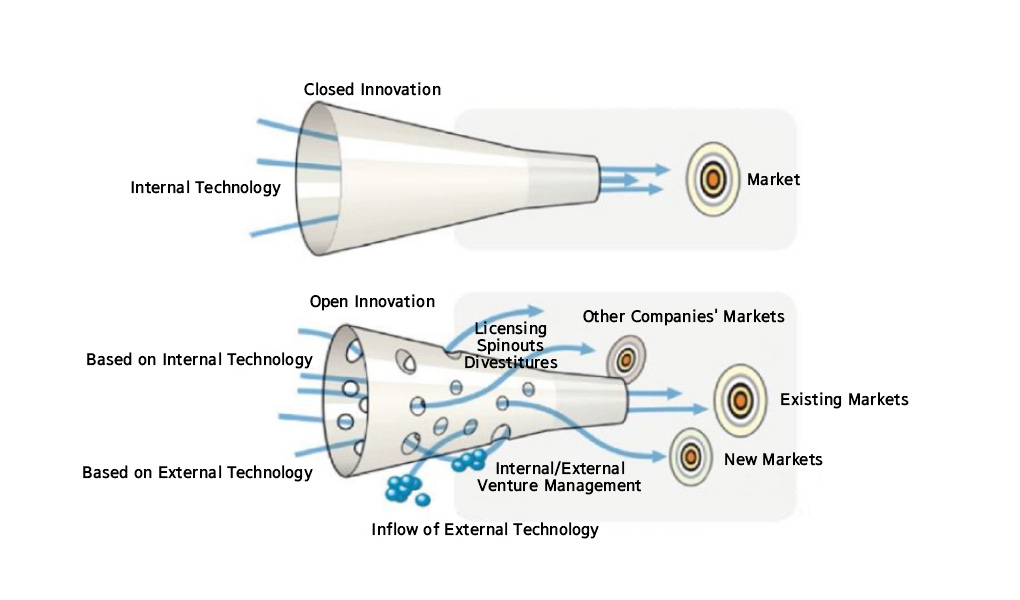
Source: [DBR] Release Internal Knowledge; External Knowledge Comes In, 2009
Comparison of Closed Innovation and Open Innovation
1 Seek Leading Indicators for ESG
Social ventures, inherently encapsulating ESG factors as they intertwine business pursuits with societal problem-solving, can be seen as pathfinders in the vast seas of ESG, where large corporations might find immediate entry challenging. Their role is to generate social impact while pursuing business objectives.
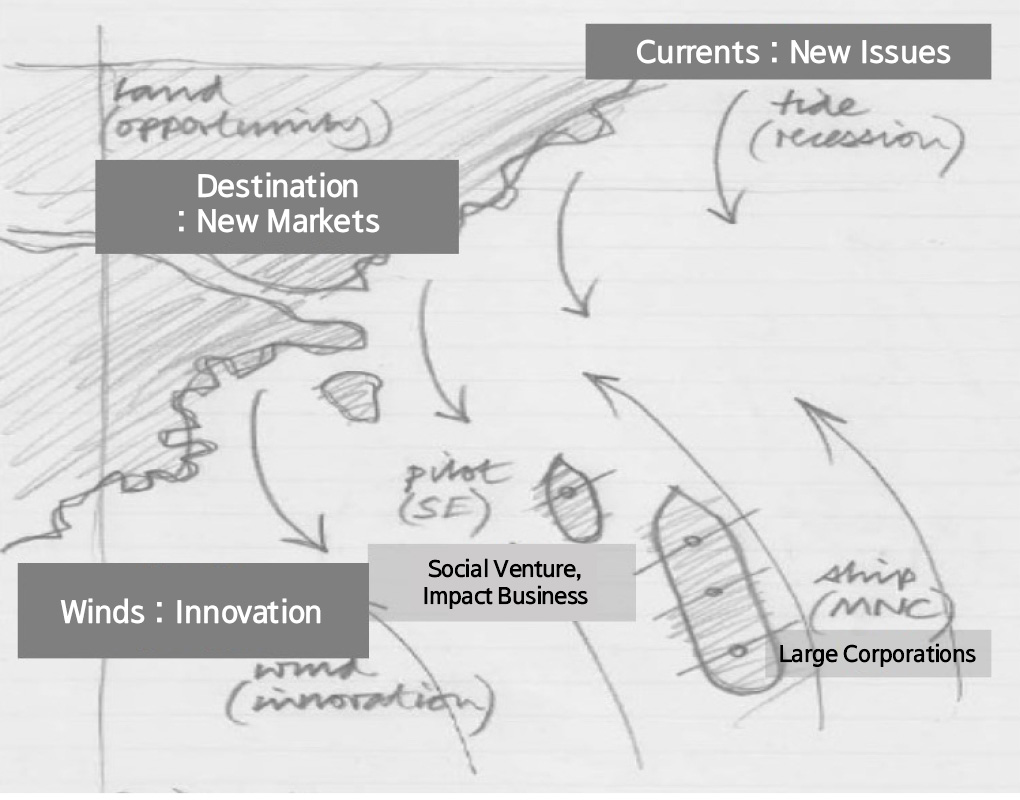
Source: The Social Intrapreneur : A Field Guide for Corporate Changemakers
From the perspective of growing companies, exploring new opportunities with social ventures through open innovation and investment is a viable path. While myriad solutions exist for environmental and societal issues, coupling the resources, capital, infrastructure, and human capacity that a company already possesses with social venture business models can hasten the ESG management approach.
2 Open Innovation for a Win-Win Strategy
Open innovation underscores that developing every domain in-house isn't always the most effective method, especially in ever-shifting landscapes. This approach seeks to proactively respond to new changes by integrating technologies, expertise, and unique resources of external organizations, aiming for internal and external innovation. ESG is a field where open innovation can truly shine.
In this light, numerous large corporations are expanding their touchpoints with startups, including social ventures. An example is the packaging material production project between Hyundai Motor Company and Foresys, a specialist in marine debris management. Foresys revitalized 11 tons of waste nets and ropes collected in the Jeju area into high-quality recycled plastic materials. Utilizing this and recycled plastic from Hyundai's waste car parts, they have manufactured reusable packaging for engine logistics operations, passing drop impact tests and verifying engine protection performance. This reusable packaging can reduce greenhouse gases emitted from incinerating cardboard boxes, contributing to societal and environmental values and saving costs associated with disposing of waste car parts, thereby aiding ESG management. This can be viewed as a win-win strategy from the corporation's perspective.

Foresys X Hyundai Motor Company, Schematic Diagram for Reusable Car Engine Logistics Operation Packaging
Furthermore, actively identifying and supporting social ventures related to a company's focal ESG issues is another approach. For this, large corporations are deploying social venture-accelerating programs. If confidence in a new business, incorporating the technology of social ventures, is established through these programs, it can develop into open innovation. Even if a technology is challenging to link to a corporation's business value chain immediately, it can be considered an opportunity for sustainable business by forming impact funds.
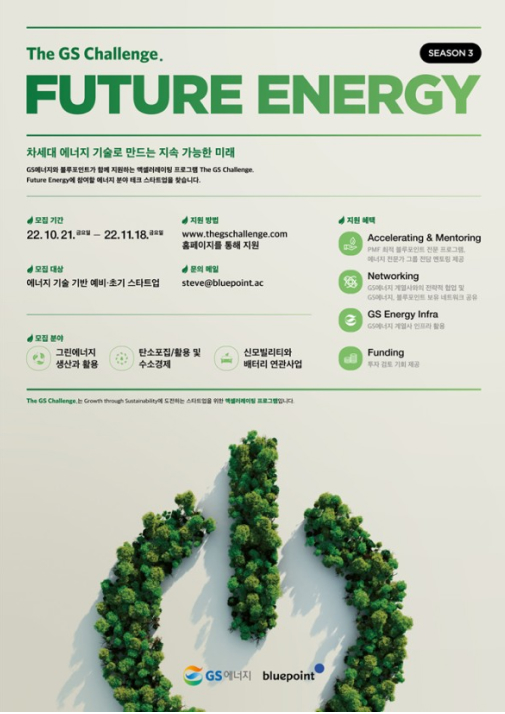
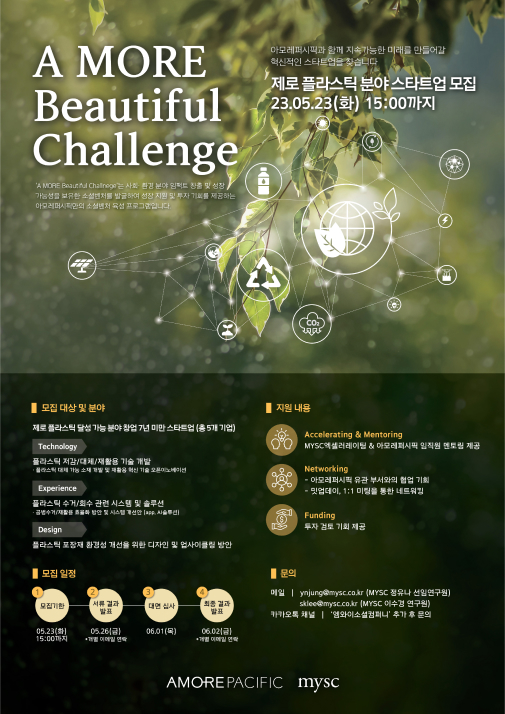
The GS Challenge Future Energy
/ Amorepacific A MORE Beautiful Challenge
3 ESG, A Priority of Concern
Then, which agenda should we address first? ESG priorities vary from company to company. However, if there's an issue no one can evade, it would be ‘plastic.’ Humanity has reaped high convenience through plastic, but now we pay the piper. About 85% of marine debris is plastic, and the non-biodegradable nature results in microplastics returning to humans through food, water, and air. The first International Plastic UN Convention is being prepared in 2024, and an international consensus on responding to plastic pollution is forming, with companies joining this movement.
The cosmetics industry is no exception. Cosmetics are all packaged to protect the product and enhance its market value. The packaging industry is 30-40% based on plastic (David Platt, 2021, The Future of Global Packaging to 2026, Smithers Pira), and 46.5% of the world's plastics are produced in the packaging and container industry.
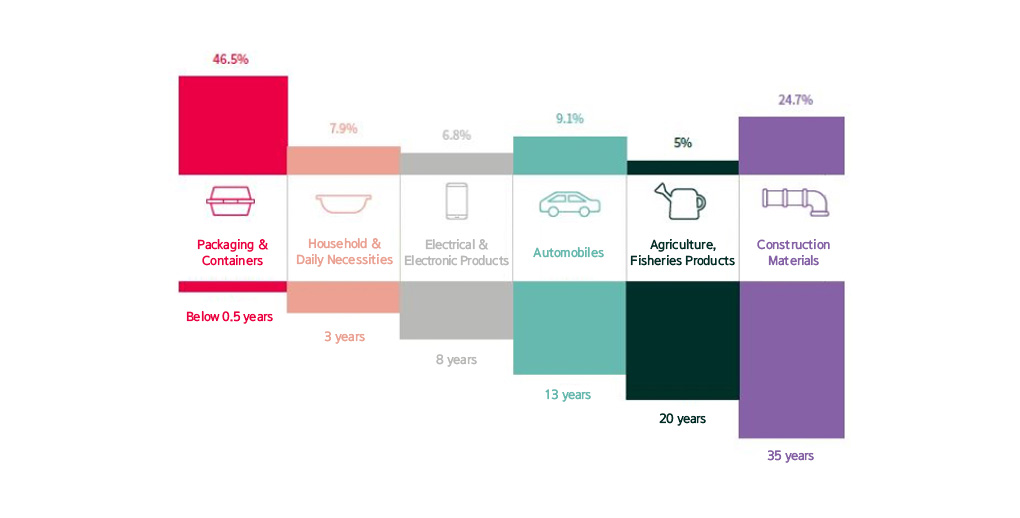
(Source: Kim Yi-seo, 2019, Plastic Republic of Korea - The Temptation of Disposable, Greenpeace East Asia Seoul Office)
Worldwide Plastic Production and Lifespan by Industry
Amorepacific discharges about 16,000 tons of plastic domestically each year. This equals 800 million water bottles, and 50% is difficult to recycle. In response, Amorepacific declared through A MORE Beautiful Promise that by 2030, it will reduce the amount of plastic used in packaging and design 100% of plastic packaging to be recyclable, reusable, or compostable. They have developed tubes and refill pouches that use paper to reduce plastic use by 70% and 90%, respectively.

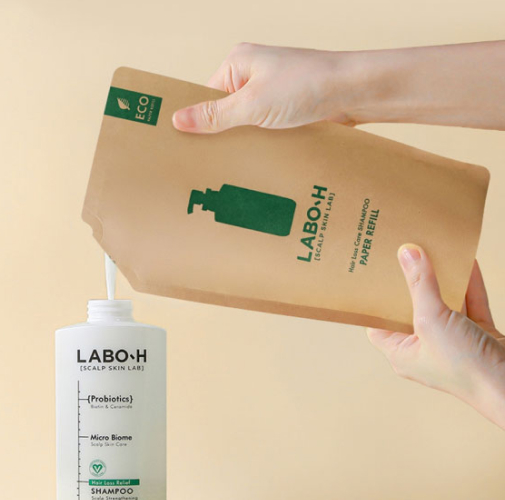
primera Skin Relief UV Protector EX
/ LABO-H Scalp Strengthening Shampoo Refill
Moreover, they are expanding their sincerity that began with the Pacific Green Movement, launching campaigns to communicate a comprehensive sense of responsibility for their cosmetic containers and extending bottle collection activities from their offline to online and other companies.
New Journey to Solve the Plastic Problem
Zero Plastic social ventures are joining this journey. They are companies participating in the 2023 A MORE Beautiful Challenge, a social venture nurturing and investment program. In this A MORE Beautiful Challenge, focusing on “plastic,” the core ESG strategy of the company, they have selected five companies that have shown growth potential in developing plastic alternatives, resource circulation solutions, and upcycling.

In the next column, we intend to explore the leading indicators of Zero Plastic by introducing the five companies participating in A MORE Beautiful Challenge.
Less Plastic. We are Fantastic!
-
Like
0 -
Recommend
0 -
Thumbs up
0 -
Supporting
0 -
Want follow-up article
0
Array ( )



